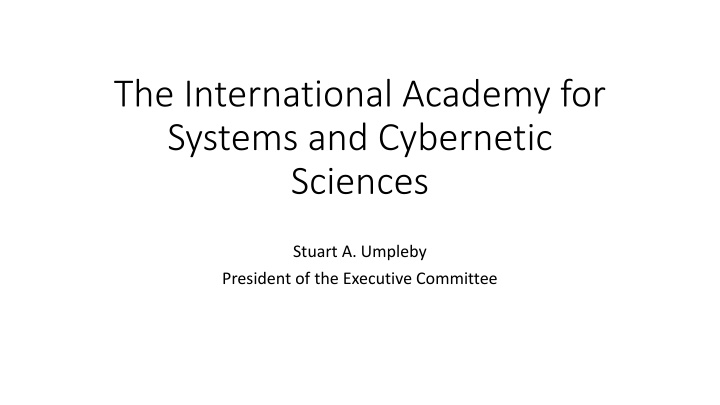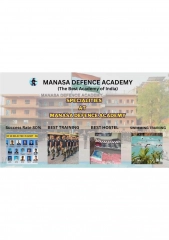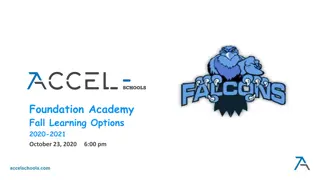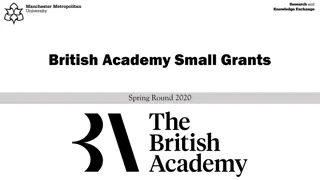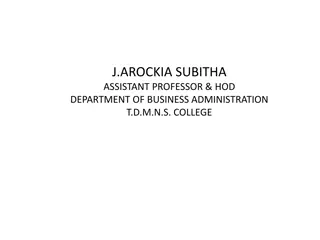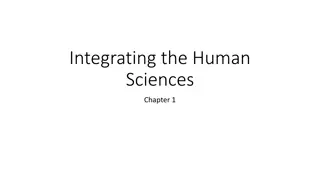The International Academy for Systems and Cybernetic Sciences - Insight and Evolution
Founders Ludwig von Bertalanffy and Norbert Wiener's vision of General Systems Theory and the significance of over-specialization in modern civilization. Learn about the foundation and growth of the Academy, its key members, and significant meetings and workshops over the years.
Download Presentation

Please find below an Image/Link to download the presentation.
The content on the website is provided AS IS for your information and personal use only. It may not be sold, licensed, or shared on other websites without obtaining consent from the author.If you encounter any issues during the download, it is possible that the publisher has removed the file from their server.
You are allowed to download the files provided on this website for personal or commercial use, subject to the condition that they are used lawfully. All files are the property of their respective owners.
The content on the website is provided AS IS for your information and personal use only. It may not be sold, licensed, or shared on other websites without obtaining consent from the author.
E N D
Presentation Transcript
The International Academy for Systems and Cybernetic Sciences Stuart A. Umpleby President of the Executive Committee
The founders Ludwig von Bertalanffy said that over-specialization was the source of problems in modern civilization. He advocated General Systems Theory as a way of building bridges among specialists, without requiring them to abandon their specialties Norbert Wiener said that the first industrial revolution substituted machines for human muscle power. The second industrial revolution would substitute machines for human intellectual tasks. This second revolution is proceeding rapidly Many variations on these themes have been created. The original ideas were kept to different degrees
How the Academy was founded The International Federation for Systems Research (IFSR) was created to assist the development of the fields of systems and cybernetics Discussions at IFSR meetings revealed that scholars in systems and cybernetics were not being elected to their national academies of science Scholars from these disciplines were not being chosen for national academies of science A solution would be to create an Academy for people who had made outstanding contributions to systems and cybernetics The Academy was created as a branch of IFSR
The first meeting of the Academy, 2010 A founding meeting was held in Chengdu, China, in 2010 Those present included Matjaz Mulej, Jifa Gu, Gary Metcalf, Gerhard Chroust, Pierre Bricage, Gerhard Chroust, and Ranulph Glanville A constitution and by-laws were written The first group of academicians was selected Pierre Bricage was chosen as Secretary General
Meetings and workshops 2010 Chengdu, China, 1stgeneral assembly 2011 Brussels, Belgium 2012 Agadir, Morocco 2014 Vienna, Austria, 2ndgeneral assembly 2014 Valencia, Spain 2015 Chengdu, China 2017 Chengdu, China 2018 Brussels, Belgium, 3rdgeneral assembly 2019 Beijing, China
Members of the Executive Committee Secretary General, Pierre Bricage, France President, Stuart Umpleby, USA Vice President, Ockie Bosch, Australia Vice President, Matjaz Mulej, Slovenia Vice President, Jifa Gu, China Honorary Former President, Robert Trappl, Austria
Countries with academicians Currently there are 59 academicians from 25 countries East Asia West Europe East Europe and Russia North America Latin America South Asia Africa 14 28 8 8 3 0 0
Sources of nominations IASCYS accepts nominations from societies that are members of one of three federations The International Federation for Systems Research (IFSR) World Organization for Systems and Cybernetics (WOSC) The European Union for Systemics (EUS) And from groups of three academicians
Criteria for acceptance as an academician Author of a renowned theory Articles and books Citations of writings Organization of conferences Journal editorships Teaching abroad or consulting Practical applications See www.iascys,org
Positive trends that support the Academy The International Council for Science has merged with the International Social Science Council to form the International Science Council, hence social science has been accepted within science Continuing advances in communication and transportation aid diffusion of ideas and collaboration Big data and data analytics provide new resources for research Software advances such as Artificial Intelligence help to incorporate research results into decision-making Handbooks and encyclopedias on systems and cybernetics are now being prepared The annual number of books on systems and cybernetics is increasing
Recent books about cybernetics Recent books about cybernetics
Future possibilities for the Academy On-line courses on systems and cybernetics Summer workshops on advances in systems and cybernetics More definitions on Wikipedia and lectures on Youtube A computer conferencing system for use by academicians Periodic reports on the state-of-the-art in subfields of systems and cybernetics
Tasks for the Academy to work on Establish more programs in systems and cybernetics in universities Experiment with John Warfield s idea of a Horizons College in universities Heritage College the sciences, arts and humanities Professional College business, law, engineering, medicine, architecture, agriculture Horizons College multi-disciplinary, problem-oriented, client-based Work on Ranulph Glanville s suggestion to make systems and cybernetics the core curriculum of design schools
Requests Please send nominations of people whom you think should be academicians Help us improve our use of computer conferencing and the web both internally and for outreach Work on projects with Academy members, for example write summaries of advances in a subfield, such as system dynamics or agent-based modeling Work on fund raising
Contact information Stuart A. Umpleby Department of Management The George Washington University Washington, DC 20052 USA blogs.gwu.edu/umpleby umpleby@gmail.com
A presentation at the European Union for Systemics Brussels, Belgium October 15-17, 2018
Total articles per year by region over Total articles per year by region over time in the three journals time in the three journals 100 90 Africa 80 Total number of articals Asia 70 Europe 60 50 Latin America 40 Middle East 30 North America 20 Oceania 10 0 1974 1977 1980 1983 1986 1989 1992 1995 1998 2001 2004 2007 2010 Years
The number of articles in 1974 and 2010 for The number of articles in 1974 and 2010 for the top ten countries the top ten countries (Ranked by the total number of articles from year 1974 to 2010) Trend for Top 10 Countries 70 USA UK China Canada Australia Spain Germany Austria France Poland 60 50 40 Number 30 20 10 0 1974 2010 Year
Attendance at conferences Blue means attendance at a conference in one s own country Red means attendance at a conference in another country Most of the activity is in Europe The Americas and Asia are also active regions Currently there are no academicians from South Asia (e.g., India and Pakistan) or Africa
